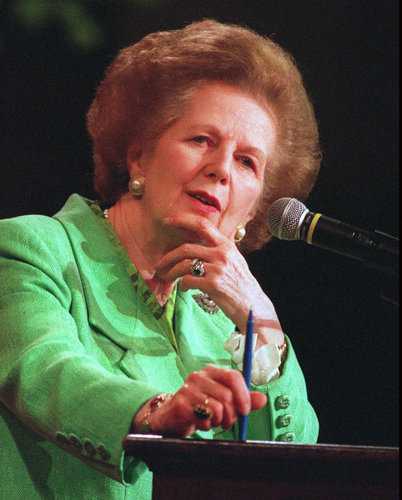By JOSEPH R. GREGORY
Published: April 8, 2013
Margaret Thatcher, the “Iron Lady” of British politics who pulled her country back from 35 years of socialism, led it to victory in the Falklands war and helped guide the United States and the Soviet Union through the cold war’s difficult last years, died Monday. She was 87.
Connect With Us on Twitter
Follow @nytimesworld for international breaking news and headlines.
Twitter List: Reporters and Editors
Readers’ Comments
Share your thoughts.
- Post a Comment »
- Read All Comments (73) »
“It is with great sadness that Mark and Carol Thatcher announced that their mother, Baroness Thatcher, died peacefully following a stroke this morning,” a statement from her spokesman, Lord Tim Bell, said.
Lady Thatcher was the first woman to become prime minister of Britain and the first to lead a major Western power in modern times. Hard driving and hardheaded, she led her Conservative Party to three straight election victories and held office for 11½ years — May 1979 to November 1990 — longer than any British politician in the 20th century.
The tough economic medicine she administered to a country sickened by inflation, budget deficits and industrial unrest brought her wide swings in popularity, culminating with a revolt among her own cabinet ministers in her final year and her shout of “No! No! No!’’ in the House of Commons to any further integration with Europe.
But by the time she left office, the principles known as Thatcherism — the belief that economic freedom and individual liberty are interdependent, that personal responsibility and hard work are the only ways to national prosperity, and that the free-market democracies must stand firm against aggression — had won many disciples. Even some of her strongest critics accorded her a grudging respect.
At home, Lady Thatcher’s political successes were decisive. She broke the power of the labor unions and forced the Labour Party to abandon its commitment to nationalized industry, redefine the role of the welfare state and accept the importance of the free market.
Abroad, she won new esteem for a country that had been in decline since its costly victory in World War II. After leaving office, she was honored as Baroness Thatcher of Kesteven. But during her first years in power, even many Tories feared that her election might prove a terrible mistake.
In October 1980, 17 months into her first term, Prime Minister Thatcher faced disaster. More businesses were failing and more people were out of work than at any time since the Great Depression. Racial and class tensions smoldered so ominously that even close advisers worried that her push to stanch inflation, sell off nationalized industry and deregulate the economy was devastating the poor, undermining the middle class and courting chaos.
At the Conservative Party conference that month, the moderates grumbled that they were being led by a free-market ideologue oblivious to life on the street and the exigencies of realpolitik. With electoral defeat staring them in the face, cabinet members warned, now was surely a time for compromise.
To Lady Thatcher, they could not have been more wrong. “I am not a consensus politician,” she had often declared. “I am a conviction politician.”
In an address to the party, she played on the title of Christopher Fry’s popular play “The Lady’s Not for Burning” in insisting that she would press forward with her policies. “Turn if you like,” she told the faltering assembly. “The lady’s not for turning.”
Her tough stance did the trick. A party revolt was thwarted, the Tories hunkered down, and Lady Thatcher went on to achieve great victories. She turned the Conservatives, long associated with the status quo, into the party of reform. Her policies revitalized British business, spurred industrial growth and swelled the middle class.
But her third term was riddled with setbacks. Dissension over monetary policy, taxes and Britain’s place in the European Community (it would later become the European Union) caused her government to give up hard-won gains against inflation and unemployment. By the time she was ousted in another Tory revolt — this time over her resistance to expanding Britain’s role in a European union — the economy was in a recession and her reputation tarnished.


Leave a Reply